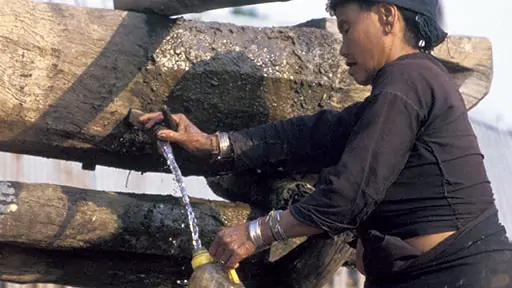Indigenous Calendar June, 2017: Like a Politician

It hasn't been the best twelve months for politicians. In Brazil the president was impeached and her successor appears to be heading for the same fate if he doesn't resign first. In South Korea the same thing happened. There is even talk of impeachment in the United States. Nor has it been the best twelve months for forcibly displaced people. We can find any number of examples of them being treated with suspicion, unwelcome and even resentment.
Australia held a general election a year ago. Career politician and Minister for Immigration and Border Protection, Peter Dutton, was among the most controversial figures during the campaigning and has been since. (His incumbent Liberal/National Coalition party won the election by the closest margin in decades. He won his own seat by a very narrow margin.) Speaking about immigrant asylum seekers he said: "They won't be numerate or literate in their own language, let alone English."
This month's photo was taken in Burma (Myanmar). The woman collecting water is a member of the indigenous An people. The world's attention was, for a brief time, focused by the mainstream media on the plight of indigenous migrants from that country but of a different ethnicity: the Rohingya. Whether they're collecting water or fleeing for their lives, speaking English is low on their list of priorities.
Indigenous Australians might ask 'why doesn't Mr. Dutton learn to speak our languages?' Living in Australia, Dutton must surely have used the word 'kangaroo.' Clearly, then, he speaks Guugu Yimidhirr. But his mastery of indigenous Australian languages likely does not end there. If he's ever had reason to use the word 'koala' he speaks Dharuk; if 'budgerigar' then Kamilaroi; if 'kookaburra' then Wiradhuri. Indeed, it is quite impressive that Dutton has also found time to learn Australia's main indigenous language, English. He is a shining example of a migrant (or, in his case, a descendant of migrants) being willing to learn the languages of their new host country.
Dutton has been so unpopular that a campaign to unseat him in the 2019 election raised A $200,000 this week. But his influence remains strong within his party. Earlier this year it proposed radical reforms to the country's naturalized citizenship requirements. Among them is university-level proficiency in English.
Having lived there for at least 50,000 years, it is only fifty years since indigenous Australians have even been counted in the national census. No mention of them is even made in its racist constitution and Australia is, today, the only former British colony or territory never to have signed any treaty with the land's indigenous peoples. But that may be about to change. This month, indigenous leaders will deliver to the government the recommendations from last month's First Nations Convention. The "Uluru Statement from the Heart" will call for both constitutional reform and a treaty to formally recognize indigenous people and their rights.
Politicians like Dutton often fail to see the irony, even the hypocrisy, of their policies. Perhaps they could learn from a paraphrase of an old song: "You don't have to live like a politician."
If you enjoyed reading this article, please consider supporting independent, advertising-free journalism by buying us a coffee to help us cover the cost of hosting our web site. Please click on the link or scan the QR code. Thanks!


